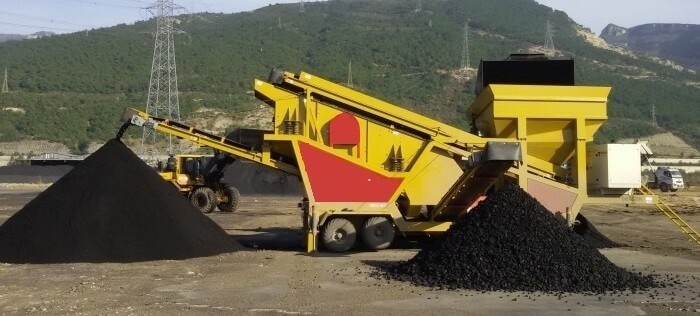1. Basic Production Process
Next-generation portable basalt crushing and screening plants typically consist of three main stages:
1.1. Coarse Crushing
Blasted basalt blocks are steadily fed through a vibrating feeder and undergo initial crushing using a jaw crusher. This step reduces the size of the large rocks into smaller fragments.
1.2. Medium and Fine Crushing
Material from the coarse crusher is passed through a vibrating screen and directed to a cone crusher via conveyors. This phase ensures a more uniform and appropriately sized output.
1.3. Screening
After fine crushing, the material is classified via multiple vibrating screens. Aggregates of desired sizes are transferred to the final product stockpile, while others are returned for reprocessing.
2. Portability and Modular Design
These new-generation plants are designed in a modular way, enabling easy transport and installation across different construction sites. Mobile crushers offer all systems on a single platform, saving space and time.
3. Eco-Friendly and Energy-Efficient Technologies
Modern portable plants are equipped with environmentally sensitive designs. Features such as dust suppression systems, water recycling units, and energy-efficient motors reduce environmental impact and operational costs.
4. Smart Control and Remote Monitoring
Advanced SCADA systems and IoT-based sensors allow remote monitoring of operations. Early detection of faults ensures predictive maintenance and minimizes downtime.
5. Production Capacity and Product Variety
These plants generally have a capacity of 150–400 tons per hour. They can produce various aggregate sizes, including 0–5 mm, 5–10 mm, 10–20 mm, and 20–31.5 mm, making them suitable for a wide range of construction applications.
6. Application Areas
Portable basalt crushing and screening plants are widely used in:
-
Asphalt and concrete production
-
Iron and steel industries
-
Recycling of demolition and construction waste
-
Road and infrastructure projects
Conclusion
Next-generation portable basalt crushing and screening plants play a crucial role in modern construction with their mobility, eco-friendliness, and high production capacities. Equipped with smart systems, they ensure efficient and sustainable production processes.
 English
English
 Le français
Le français
 Türkçe
Türkçe

